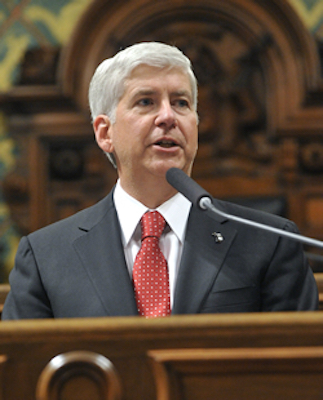Michigan Gov. Rick Snyder has signed a package of bipartisan bills aimed at revitalizing communities across Michigan by allowing transformational projects to capture state sales and income taxes to redevelop challenging sites into developments that will foster jobs and economic growth.
“As part of Michigan’s reinvention, it’s important that we continue to revitalize our downtowns, waterfronts and main streets to attract and keep talent and business continually growing in our great state,” says Gov. Snyder. “This legislation is key to closing existing funding gaps surrounding brownfield sites and creating vibrant communities where Michiganders can live, work, and play.”
The five-bill package includes:
- SB 111, sponsored by Sen. Ken Horn, which outlines the key elements of the proposal. The three kinds of income tax capture allowed under the package include construction period tax capture revenues, withholding tax capture revenues, and income tax capture revenues, in addition to property tax increments. The purchase of certain tangible personal property used in eligible brownfield redevelopment activities would be exempt from sales and use taxes.
- SB 112, sponsored by Sen. Jack Brandenburg, which amends the Income Tax Act to provide that, from total income tax revenue collected, an amount equal to the construction period tax capture revenues, withholding tax capture revenues, and income tax capture revenues attributable to Transformation Brownfield Plans (TBPs) shall be deposited each state fiscal year into the State Brownfield Redevelopment Fund.
- SB 113, sponsored by Sen. Tom Casperson, which amends the General Sales Tax Act to exempt from sales taxes the sale of tangible personal property for use in eligible brownfield redevelopment activities on eligible property included in a TBP, to the extent that the tangible personal property will be affixed and made a structural part of the real property or infrastructure improvements included within the TBP.
- SB 114, sponsored by Sen. Peter MacGregor, which amends the Use Tax Act to exempt from use taxes tangible personal property acquired by a person engaged in the business of altering, repairing, or improving real estate for others, or to the manufacturing of a specific product if the property or product will be affixed or made a structural part of improvements to real property included within a TBP, to the extent that those improvements are eligible activities on eligible property within a TBP.
- SB 115, sponsored by Sen. Steve Bieda, which amends the Michigan Renaissance Zone Act to provide that, where a renaissance zone overlapped with a TBP, the property owner and local government unit may request that exemptions from the Income Tax Act and City Income Tax Act not apply within the overlapping portion of the renaissance zone. The Michigan Strategic Fund and city levying the income tax would decide whether to approve the request.
The Michigan Thrive Coalition, a combination of economic development organizations, cities, and chambers of commerce also supported the legislation. More information on the bill package can be found here.






